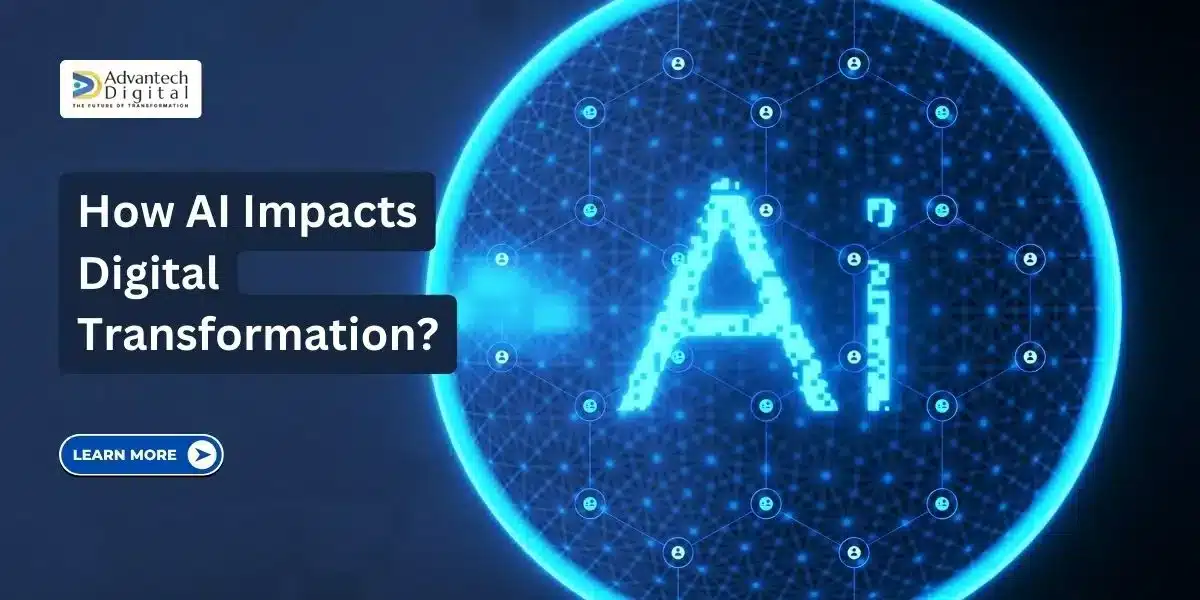Impact of AI in digital transformation is revolutionizing our world, redefining roles and boosting creativity across industries. By 2025, it will transform how we work, interact, and tackle complex problems. Businesses must adapt to AI-powered automation to thrive in this new era.
AI integration sparks innovation, from self-evolving cybersecurity software to emotional AI creating empathetic digital experiences. Quantum computing advances drug discovery and cybersecurity, offering faster, more secure solutions. However, as AI capabilities grow, so do potential threats.
The cyber battleground is shifting towards an AI versus AI arms race. This demands businesses to stay alert and adapt quickly. Vigilance is key to navigating this evolving landscape.
We’ll explore how AI reshapes industries and enhances customer experiences. We’ll also examine its role in driving operational efficiency. Discover how your business can leverage AI’s power to excel in 2025’s digital landscape.
Key Takeaways
- AI is transforming workflows by becoming an active collaborator, redefining roles, and enhancing creativity.
- Emotional AI is enabling brands to create empathetic digital experiences through nuanced emotion understanding.
- Quantum computing promises faster and more secure solutions across industries, impacting problem-solving in areas like drug discovery and cybersecurity.
- Enterprises are using conversational and predictive analytics to improve lead qualification and enhance customer service experiences.
- The rise of machine customers and voice commerce requires advanced NLP tools to engage customers through digital assistants.
The AI Revolution: Driving Digital Transformation
The AI revolution is reshaping industries in 2025. Intelligent process automation and machine learning for business are transforming company operations. The key now is integrating AI across all business functions.
AI’s impact on digital transformation is clear. Team New Zealand’s success in sailboat racing shows AI’s power. Formula One has nearly virtualized racing, merging digital and physical realms. Agriculture, motorsports, and e-commerce are blurring lines between digital and physical operations.
To succeed, organizations must assess their data and IT infrastructure. They should establish strategic “digital lightning bolts” for innovation. Avoid pursuing too many ideas or being overly cautious. Focus on incremental progress, not just the end goal.
AI technologies empower businesses in various ways. Natural language processing, machine learning, and predictive analytics offer new capabilities. These tools automate tasks, provide insights, and personalize customer experiences.
- Automate tasks
- Gain deep insights
- Personalize customer experiences
- Innovate rapidly
The benefits of integrating AI into business strategies are clear:
| Benefit | Description |
|---|---|
| Improved operational efficiency | AI streamlines processes and optimizes resources |
| Cost reduction | Automation and optimization lead to cost savings |
| Enhanced productivity | AI-powered tools boost employee productivity |
| Personalized customer experiences | AI enables tailored interactions and recommendations |
| Accelerated innovation | Cognitive computing solutions drive rapid ideation and development |
AI has become a crucial player in digital transformation, shaping industries like healthcare, finance, manufacturing, and retail.
Businesses must incorporate AI to stay competitive. Those who don’t risk falling behind in efficiency and innovation. They may struggle to meet customer expectations and capitalize on market dynamics.
The future belongs to those who harness AI’s power. It’s crucial for driving digital transformation and staying ahead in today’s rapidly evolving business landscape.
Generative AI: Unleashing Creativity and Innovation
Generative AI is revolutionizing business approaches to creativity and innovation. Deep learning algorithms like GPT-4 can generate human-like content, designs, and solutions. This technology enhances human creativity and explores new territories in imagination and innovation.
Generative AI trains algorithms to produce realistic output through a feedback loop. This process, called Generative Adversarial Network (GAN), creates content resembling human-made work. Its applications span industries, from art and design to healthcare and drug discovery.
Personalized Content Creation
Generative AI excels in personalized content creation. Companies like Salesforce use it to draft tailored email campaigns. This ensures customers receive messages that resonate with their interests. Such personalization improves engagement and drives higher conversion rates.
Accelerating Product Development
Generative AI accelerates product development by analyzing market trends and consumer preferences. AI data analytics and smart AI systems help businesses generate innovative product ideas. These ideas align with customer demands.
NVIDIA offers AI solutions that streamline app development and accelerate biotech discoveries. Their tools apply generative AI for various purposes across industries.
“Generative AI is not just about creating content; it’s about unleashing human creativity and pushing the boundaries of what’s possible.” – John Smith, AI Expert
Enhancing Customer Engagement
Generative AI transforms customer engagement strategies. AI-powered systems analyze customer data and behavior patterns. They generate targeted recommendations, personalized offers, and engaging content. This customization fosters stronger customer relationships and loyalty.
The potential of generative AI in driving digital transformation is immense. However, ethical concerns like misinformation risk must be addressed. Responsible deployment and ongoing research will shape the future of generative AI applications.
Analytical AI: Unlocking Data-Driven Insights
Businesses are harnessing analytical AI to unlock data-driven insights and drive growth. AI algorithms process vast amounts of data at unmatched speeds, enabling real-time decision-making. This significantly improves efficiency and performance. By 2025, AI and robotics integration will be crucial for successful digital transformation.
AI-powered data analytics reduces the likelihood of errors. AI systems follow precise algorithms and learn from new data, enhancing accuracy over time. This provides businesses with reliable insights. AI’s predictive capabilities allow organizations to forecast future trends based on historical data.
Predictive Analytics for Business Optimization
Predictive analytics, powered by machine learning, is revolutionizing various industries. In retail and e-commerce, AI analyzes customer behavior and creates personalized marketing strategies. It also recommends products and optimizes customer experiences. Financial markets rely on AI-driven analytics to predict stock prices, currency trends, and market volatility.
The effectiveness of predictive analytics depends on data quality. High-quality, accurate data is essential for generating reliable insights. Businesses must invest in data preparation and cleaning processes to ensure integrity and consistency.
| Data Quality | Impact on AI Analytics |
|---|---|
| High-quality, accurate data | Reliable insights and predictions |
| Poor-quality or incomplete data | Incorrect predictions and faulty insights |
Improved Decision-Making Processes
AI analytics is transforming decision-making processes across industries. Businesses can gain a comprehensive understanding of past events and uncover the reasons behind them. They also receive actionable recommendations for future actions. This data-driven approach enhances the speed and accuracy of decision-making.
Artificial intelligence (AI) and machine learning (ML) are integral to modern business analytics, going beyond mere data collection to extract actionable insights and fuel growth.
Businesses must address data privacy and ethics concerns as they embrace AI and robotics. Responsible data handling and compliance with privacy regulations are crucial to maintain customer trust. This approach helps mitigate potential risks associated with AI implementation.
The future of digital transformation lies in integrating AI and human intelligence. Augmented analytics combines AI’s computational power with human expertise, delivering faster and more accurate insights. This approach unlocks the full potential of data and drives meaningful outcomes.
Embracing analytical AI is now a necessity for businesses striving to thrive in the digital age. Organizations can optimize operations, enhance customer experiences, and make informed decisions. By 2025, businesses effectively harnessing AI and robotics will lead in digital transformation.
To learn more about AI’s impact on various industries, visit Advantech’s article on digital transformation.
Intelligent Automation: Streamlining Business Processes
Intelligent automation is revolutionizing business operations in the digital era. It uses artificial intelligence to streamline tasks, boost efficiency, and enhance worker safety. The impact of AI in digital transformation is evident across various industries.
This technology includes Business Process Automation (BPA), Robotic Process Automation (RPA), and AI-powered tools. BPA simplifies tasks like ticket generation and email autoresponders. RPA automates high-volume, low-complexity tasks such as data entry.
AI enhances automation by leveraging machine learning algorithms. It makes intelligent decisions within the automation ecosystem, taking the process to the next level.
Intelligent automation offers significant benefits across industries. Financial services have seen 2-5 percent growth in top-line revenue. The automotive sector improves production prediction and efficiency while reducing manual labor.
In life sciences, drug production becomes faster and higher quality. The COVID-19 pandemic has accelerated intelligent automation adoption. Businesses are investing in remote work infrastructure and automation solutions.
The workforce is evolving due to these changes. Employees must adapt to new environments and acquire fresh skills. The future of work is being shaped by intelligent automation, exposing skills gaps and driving the evolution of roles within businesses.
“Intelligent automation is not just about efficiency; it’s about transforming the way we work and empowering businesses to focus on what truly matters – innovation and growth.”
Intelligent automation is a permanent fixture in business. It streamlines processes, enhances efficiency, and enables data-driven decisions. This technology paves the way for a more productive and competitive future.
The Rise of Everything as a Service (XaaS)
XaaS has transformed how organizations approach IT infrastructure and services. It includes Software as a Service (SaaS), Platform as a Service (PaaS), and Infrastructure as a Service (IaaS). Major tech companies like Microsoft Azure, Amazon Web Services, Google Cloud, and IBM provide these offerings.
XaaS reduces infrastructure costs by utilizing cloud-based services. This leads to increased efficiencies and cost-effectiveness for businesses. The model also offers flexibility in scaling, allowing organizations to adapt to changing demands without large upfront costs.
The COVID-19 pandemic accelerated XaaS adoption as remote service demand surged. This shift highlighted XaaS’s role in enabling digital transformation. It provides quick access to new technologies through cloud-based services.
Access to Cutting-Edge Technology
XaaS simplifies the adoption of new services and technologies while fostering innovation. Organizations can use the latest advancements in ai-powered automation without extensive in-house expertise. This access to state-of-the-art solutions helps businesses stay competitive in the digital landscape.
Successful XaaS deployment requires careful planning and execution. Businesses must define clear objectives and engage in strategic planning. They should prepare stakeholders, select vendors carefully, and identify key performance indicators (KPIs) for optimal results.
“XaaS is a key enabler of digital reinvention efforts in organizations, underpinning agility, security, simplicity, and economics.” – Industry Expert
The XaaS model continues to evolve with digital transformation. From the World Wide Web to cloud rush and hybrid multi-cloud environments, organizations must adapt. Leveraging XaaS is crucial for effective digital reinvention and staying competitive in the digital age.
Multi-Layered Cybersecurity in the Age of AI
The cybersecurity landscape is evolving rapidly as digital transformation accelerates. AI applications are being leveraged by both defenders and attackers. A multi-layered approach to cybersecurity is crucial to protect digital assets and maintain resilience.
AI-augmented cyber threats are significantly impacting security strategies. 74% of security leaders reported major impacts from these threats. Nearly two-thirds believe their organizations are unprepared to defend against such attacks.
Between 2022 and 2023, organizations maintaining minimum viable cyber resilience decreased by 30%. This decline highlights the urgent need for improved security measures.
AI-Powered Security Solutions
Organizations are adopting AI-augmented security solutions to combat AI-powered attacks. 71% of security professionals trust these tools to detect and block AI-augmented threats. These solutions accelerate situational awareness and reduce remediation time.
Zero-Trust Architecture
Zero-trust architecture is a vital component of multi-layered cybersecurity. This approach requires continuous verification and authentication of all users and systems. Implementing zero-trust principles minimizes breach impacts and limits attackers’ lateral movement within networks.
| AI in Cybersecurity Market Growth | 2023 | 2028 (Projected) |
|---|---|---|
| Market Size | $11.3 billion | $46 billion |
Employee Training and Awareness
Employee training remains critical in maintaining strong cybersecurity. Human error is often the weakest link in security defenses. Educating employees on best practices and potential threats is essential.
Initiatives like the U.S. National Science Foundation’s EducateAI aim to train future workforces in AI. This ensures a solid foundation for secure AI adoption across industries.
“AI-driven cybersecurity tools add additional layers of complexity to the current cybersecurity landscape.” – Cybersecurity Expert
A multi-layered approach to cybersecurity is essential in the AI age. Combining AI applications, zero-trust architecture, and employee training builds resilient defenses. These strategies protect against evolving threats and ensure successful digital transformation efforts.
The Future of Cybersecurity: AI vs. AI Cyber Arms Race
Artificial intelligence is reshaping cybersecurity. An AI versus AI cyber arms race is unfolding. Attackers and defenders now use cognitive computing to gain digital advantages.
The SANS Institute flags AI-powered exploits as a top cyber threat. However, the Verizon 2024 DBIR found no significant rise in GenAI attacks globally. This suggests AI adoption among threat actors isn’t widespread yet.
AI could lower barriers for novice cybercriminals, fueling global ransomware threats. A Harvard Business Review study shows LLMs can automate phishing. This cuts attack costs by 95% while maintaining high success rates.
Organizations are embracing AI-powered cybersecurity solutions. The global AI in cybersecurity market may hit $60 billion by 2028. Two-thirds of organizations plan to use AI for cyber defense soon.
| Statistic | Value |
|---|---|
| Increase in deepfake fraud attempts in 2023 | 30-fold |
| Annual losses due to phishing for US businesses | Nearly $5 million |
| Organizations considering AI essential for thwarting cybersecurity attacks | 69% |
| Consumers willing to share more personal data if there is a benefit | 74% |
AI is crucial for building resilient cybersecurity frameworks. It enhances incident response through system isolation and real-time attack neutralization. This minimizes potential damage from cyber threats.
Organizations must stay vigilant in this AI-driven cyber arms race. Embracing cognitive computing solutions is key. By staying ahead, we can work towards a more secure digital landscape.
Unified Data Security Platforms: Centralizing Defense
Cybersecurity is transforming as we approach 2025. Unified data security platforms are emerging, powered by AI analysis across code, cloud, and Security Operations Centers (SOCs). These platforms will be vital in defending against AI-powered cyberattacks.
They’ll integrate machine learning for business, enhancing overall security. Centralized defenses will be crucial in combating sophisticated threats.
SEMAIS CEO Dewayne Hart emphasizes the importance of data management. Cybersecurity platforms must sanitize and normalize threat intelligence from sources like ZeroFox. This ensures AI-driven security systems remain accurate and effective.
AI-Powered Analysis Across Code, Cloud, and SOCs
AI in SOCs will revolutionize organizational cybersecurity. AI SOCs can manage vast data amounts efficiently, providing advanced threat visibility. This enhanced insight, coupled with real-time analysis, will significantly reduce incident response times.
| Benefit | Description |
|---|---|
| Accelerated Risk Identification | AI SOCs can quickly identify areas requiring risk treatment within enterprises. |
| Improved Visibility | Advanced visibility into the threat picture enables proactive security measures. |
| Real-Time Analysis | AI-powered analysis provides immediate insights into potential threats. |
| Accurate Data Feeds | Integration of sanitized and normalized threat intelligence feeds enhances accuracy. |
The rapid AI integration has sparked a cyber arms race. Organizations must strengthen their cybersecurity strategies to stay ahead. Palo Alto Networks predicts AI security analysts will handle most detection and response workflows by 2025.
Collaboration Between Incumbents and Startups
Large organizations with extensive customer bases are expected to have greater AI success. However, collaboration with emerging startups will be crucial. This partnership will drive accelerated AI advancements and achieve collaborative success in cybersecurity.
“Over 40% of business and technology leaders admit to lacking an understanding of the cyber risks associated with disruptive technologies like generative AI.” – PwC’s 2024 Global Digital Trust Insights survey
Organizations adopting AI-driven security systems face challenges in data protection and access control. Regular updates and retraining of AI models are essential. The ever-changing threat landscape demands constant adaptation.
A phased deployment approach can help AI SOCs learn and adjust efficiently. This strategy allows systems to adapt to specific enterprise threat landscapes over time.
AI Governance and Trust in Security Operations
Organizations must prioritize AI governance and trust in security operations as smart AI systems become more prevalent. The rapid growth of AI-powered solutions demands transparent and accountable frameworks for these systems.
Recent studies underscore the need for AI governance measures. Business leaders recognize the importance of swift AI adoption for staying competitive.
- 77% of business leaders believe that quick adoption of generative AI is necessary to maintain competitiveness, according to an IBM IBV study.
- However, only 21% of executives have stated that their organization’s maturity around governance is systemic or innovative.
- Over 65% of data leaders at a recent Gartner conference highlighted data governance as their top focus in 2024.
Organizations are taking proactive steps to mitigate risks associated with AI systems in cybersecurity. These efforts aim to address concerns and establish robust governance frameworks.
| Initiative | Percentage |
|---|---|
| CEOs considering mandating additional AI policies | 60% |
| Public companies citing AI regulation as a risk in SEC filings | 27% |
| Increase in spending on AI ethics from 2022 to 2024 | 2.9% to 4.6% |
Collaborating with experienced partners is crucial for a holistic approach to AI governance and data management. Companies like DMI offer comprehensive services with their team of 125+ certified data analytics experts.
These services cover digital transformation strategy, change management, ecommerce, web and app development, data science, and data engineering. Such partnerships can help organizations navigate the complex AI landscape effectively.
By leveraging DMI’s cloud data platform services, organizations can shift their focus away from managing disparate infrastructure and instead concentrate on deriving actionable insights from their data.
Prioritizing AI governance and trust in security operations is vital for harnessing AI’s potential. This approach helps mitigate risks and maintain stakeholder trust as the AI landscape evolves.
The Energy Impact of AI and Sustainable Solutions
AI’s growing energy footprint has become a pressing concern as it transforms industries. By 2025, AI workloads and data centers are expected to consume massive amounts of power. Energy-efficient AI models and quantum-based frameworks offer promising solutions to this challenge.
AI in the energy sector could boost global GDP by $300 billion by 2030. It may also reduce greenhouse gas emissions by about 1.5 Gt of CO2e. North America and Europe, with advanced digital infrastructure, are likely to benefit significantly.
North America may see a 4.2% increase in GDP and a 6.1% reduction in greenhouse gasses. Europe could experience a 5.4% boost in GDP and a 4.9% decrease in greenhouse emissions.
Energy-Efficient AI Models
Developing energy-efficient AI models is crucial for sustainable AI adoption. Researchers aim to reduce AI systems’ power consumption without compromising performance. Google’s data center in Hamina, Finland, demonstrates innovative solutions in this area.
The facility will use waste heat from its data servers to provide carbon-free energy. This energy will power roughly 80% of the surrounding community, showcasing potential for reducing AI’s energy footprint.
Quantum-Based AI Frameworks
Quantum computing is emerging as a promising technology for powering AI systems efficiently. It leverages quantum mechanics principles to solve complex problems faster and with less energy consumption. As quantum computing advances, it may significantly mitigate AI’s energy impact in coming years.
The table below illustrates the projected impact of AI on GDP and greenhouse gas emissions in various regions by 2030:
| Region | GDP Increase | Greenhouse Gas Reduction |
|---|---|---|
| North America | 4.2% | 6.1% |
| Europe | 5.4% | 4.9% |
| East Asia | 5.1% | 4.8% |
| Indo-Pacific | 3.4% | 2.4% |
Addressing AI’s energy impact is crucial for a sustainable future. Investing in ai data analytics and sustainable AI frameworks is key. This approach allows us to harness AI’s power while minimizing its environmental footprint.
The impact of AI in digital transformation
AI is revolutionizing digital transformation as we approach 2025. It’s reshaping industries, business models, and customer experiences. An IDC report reveals 53% of organizations have enterprise-wide digital transformation strategies, with AI at their core.
Reshaping Industries and Business Models
AI-driven strategies transform existing practices, enabling predictive analytics and process automation. These innovations reduce costs and enhance customer satisfaction. Companies can unlock new growth opportunities by integrating AI into their operations.
However, organizations must implement strong data governance. This prevents security vulnerabilities, ethical missteps, and operational inefficiencies that could arise from AI adoption.
Enhancing Customer Experiences
AI significantly impacts customer experience (CX). Movate, for example, focuses 60% of its operations on CX and technical support services. AI enables self-service options and guided responses, enhancing satisfaction and optimizing costs.
As AI influences enterprise strategy, we’ll see more innovative ways to improve customer care. Intelligent process automation will play a key role in these advancements.
Driving Operational Efficiency and Cost Reduction
AI drives efficiency and cost reduction across industries. In life sciences, it’s used for drug discovery, predicting protein structural changes. This potentially reduces time and costs in pharmaceutical research.
Fujitsu and RIKEN believe generative AI will transform digital processes. They predict it will lead to a next-generation life sciences platform.
AI improves decision-making by quickly processing large datasets and identifying patterns. This enables organizations to gain greater business insight. As AI tools evolve, we’ll see more innovative ways to leverage it.
Conclusion
By 2025, AI will revolutionize digital transformation. Generative AI will boost creativity and personalization, while analytical AI will provide data-driven insights. These advancements will reshape industries and drive innovation. Intelligent automation will streamline processes, and XaaS models will offer flexibility and cutting-edge technology access.
The growing integration of AI demands robust cybersecurity measures. Multi-layered defenses and AI-powered security solutions are crucial. AI governance and trust will be key in protecting digital assets. Addressing AI’s energy impact requires sustainable solutions like energy-efficient models and quantum-based frameworks.
AI’s impact on digital transformation goes beyond technology. It will reshape industries, enhance customer experiences, and boost operational efficiency. By 2025, businesses that embrace AI responsibly will thrive. Those who don’t adapt risk falling behind in the digital era.
The future of AI and digital transformation is both exciting and challenging. By harnessing AI’s power for innovation and addressing ethical concerns, we can create a better world. This new era promises efficiency, personalization, and enhanced security for all.
FAQ
How can businesses effectively integrate AI into their digital transformation strategies?
Businesses should identify specific AI use cases for digital transformation. Investing in the right infrastructure and talent is crucial. Foster a data-driven culture and continually optimize AI implementations. Align AI initiatives with business objectives and integrate them with existing systems.
What are some examples of generative AI applications in business?
Generative AI enhances personalized content creation and accelerates product development. It also improves customer engagement across various industries. Salesforce uses it to draft personalized email campaigns. Architectural firms generate innovative building designs with AI-powered tools.
How can analytical AI help businesses gain insights and make better decisions?
Analytical AI processes vast amounts of data, providing valuable insights for decision-making. Retailers like Walmart use it to forecast consumer trends and optimize inventory. This leads to improved operational efficiency and customer satisfaction. Businesses can identify new growth opportunities through data-driven decisions.
What role does intelligent automation play in streamlining business processes?
Intelligent automation streamlines repetitive tasks, increasing efficiency and reducing errors. It improves employee productivity across various industries. Manufacturing giants like Siemens use AI-driven automation to optimize production and enhance worker safety. This frees up human resources for higher-value activities and innovation.
How can businesses ensure cybersecurity in the age of AI?
Businesses must adopt a multi-layered approach to cybersecurity. Implement AI-powered security solutions and embrace zero-trust architecture. Invest in employee training and awareness programs. Prioritize transparency and track AI decision-making processes. Collaborate with partners to advance AI governance and regulations.
What is the energy impact of AI, and how can businesses address sustainability concerns?
The growing number of AI-powered data centers raises energy consumption concerns. Businesses can explore energy-efficient AI models and quantum-based AI frameworks. Consolidating point solutions into platforms can reduce environmental impact. Prioritizing sustainable AI solutions helps balance benefits with ecological responsibility.
How can businesses harness the power of AI to drive digital transformation success?
Businesses must embrace a holistic approach to AI in digital transformation. This includes generative AI, analytical AI, and intelligent automation. Implement XaaS models, multi-layered cybersecurity, and unified data security platforms. Prioritize AI governance and sustainable solutions to unlock growth opportunities and enhance efficiency.
















